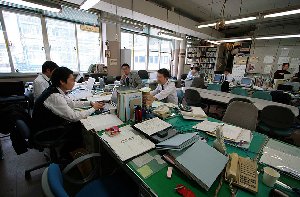- Two published biographies, about Churchill & Jackson, can teach us some important lessons regarding leadership.
 I took a Caribbean cruise over the Christmas holidays. Once I'm on board, I don't disembark too often as I've already seen most of the sights. Instead, I prefer to catch up on my reading. While the passengers are ashore, I have the run of the ship to myself. It's very peaceful and relaxing I might add. As I grow older, I now gravitate to biographies and history as I find it more interesting than fiction. On this particular trip, I read two books:
I took a Caribbean cruise over the Christmas holidays. Once I'm on board, I don't disembark too often as I've already seen most of the sights. Instead, I prefer to catch up on my reading. While the passengers are ashore, I have the run of the ship to myself. It's very peaceful and relaxing I might add. As I grow older, I now gravitate to biographies and history as I find it more interesting than fiction. On this particular trip, I read two books:
"CHURCHILL & SEA POWER" - Christopher M. Bell (2013, Oxford University Press, ISBN 987-0-19-969357-3) - Bell, is an Associate Professor of History at Dalhousie University in Halifax, Nova Scotia..
"AMERICAN LION - ANDREW JACKSON IN THE WHITE HOUSE" - Jon Meacham (2008, Random House, ISBN 978-0-8129-7346-4) - Meacham, is executive editor and executive VP at Random House. He is also a former editor-in-chief of "Newsweek."
Both books had their own unique story to tell, but from my perspective they provided me with some interesting insight into what made Churchill and Jackson effective leaders. In Part One, herein, I will first discuss the Churchill book. In Part Two, I will address the Jackson book and make some conclusions about both leaders.
"CHURCHILL & SEA POWER"
This was certainly not my first book on the legendary former Prime Minister. Years ago I read William Manchester's "THE LAST LION, Winston Spencer Churchill: Alone, 1932-1940" (1988, Little, Brown and Company, ISBN 0-316-54512-0) which I still consider the authoritative description of Churchill between the world wars. I recently purchased Bell's book as I wanted to know more about the Gallipoli campaign which is generally regarded as a major failure of Churchill's. In fact, the purpose of the Bell book is to analyze the prime minister's failures over the years in order to ascertain if the blame truly belonged to him, or possibly rested elsewhere. In other words, Bell was attempting to impartially set the record straight. In particular, Bell challenges the findings of Captain Stephen Roskill who was charged with producing the official British history of naval operations in World War II, where he was highly critical of Churchill's perceived "interferences" with naval strategy.
By the time Churchill assumed the role of Prime Minister in 1940, he was uniquely qualified as a military leader. He saw active duty in the Army during the Boer War, was Lord of the Admiralty (twice), and was a proponent of Air Power. Whether he was working at the Admiralty, Treasury, Exchequer, or as PM, all jobs were performed with the same level of zeal and vigor.
As the British Isles are separated from Europe, it naturally relied on naval supremacy to form a defensive shield around it. This meant the thinking in military circles was more defensive in nature as opposed to offensive, particularly during the 20th century. This didn't sit well with Churchill who always wanted to take the war to the enemy as opposed to waiting to be pummeled by his opponent. He despised military idleness, whether it be in the Navy, Army or Air Force, particularly when there were offensive opportunities available. This thinking was in sharp contrast to military planners at the time.
During the first World War, when Churchill served as First Lord of the Admiralty (overseeing the Royal Navy), he proposed the Dardanelles Campaign in Turkey whereby he intended to move a force of aging Dreadnaughts, along with one modern battleship, up into the Dardanelles straight and pound Turkish positions, possibly going as far as Constantinople (today's Istanbul). It was thought the Turks would be weak, and with a show of force from Britain, they would renege their support of Germany. Should anything go wrong, the naval force could easily retire from their positions back into the Mediterranean Sea. The plan was simple and could have succeeded, but it was considered too risky by military planners who insisted on invading the Gallipoli peninsula with a force of approximately 70,000 men. As the British were to discover, the Turks were in a better position to defend their land and much tougher to fight than was envisioned, thereby becoming a bloody defeat and an embarrassing loss. Churchill was blamed for the defeat which ultimately cost him his position as head of the Admiralty and politically devastated his career, which took several years to rebuild. As Bell points out in his book, Churchill's original plan was much simpler in ambition and scope, but he bowed to the conservative views of the military who brought in the Army as part of the campaign. Even though it was not entirely his fault, Churchill assumed the blame for the defeat and nobody else.
During World War II, when Churchill was now serving as PM, the Nazis were dependent on iron ore from Sweden for their development of armaments. This was being shipped through the northern Norwegian port of Narvik. As Norway was still neutral at the time, Churchill devised a plan to invade Norway and seize the port, thereby intercepting the flow of iron ore to Germany. Again, conservative military planners thought this was too risky and required a massive buildup of forces on the ground to repel Germany should they decide to retaliate, and to mine the waters. The operation was delayed due to intensive planning. In the meantime, the Nazis trumped the British by invading and seizing the country in its entirety. Again, Churchill's plans were thwarted by indecision and caution. As before, Churchill assumed lone responsibility for the failure while others remained silent.
As a leader, Churchill was well informed, decisive, and probably not as "reckless" as his critics would argue. He possessed an intellectual curiosity on just about everything and thrived on debate, either in public forums or close personal relations. He would challenge his advisers to stand up to his arguments and would be frustrated when they would not. Bottom-line, he would listen to his subordinates, but they would have to argue to defend their positions. While some would suggest Churchill was "browbeating" his people, he was simply challenging them to think and take a stand, a smart tactic in motivating people.
As Bell points out, in the end, Churchill's record was misunderstood by the public and his critics, leaving it to historians to sort out his intentions. There is considerable detail in the book to support his arguments, but what emerges from the pages is a profile of a strong leader with a Type "A" personality who is bold and imaginative, and deeply frustrated by cautious people particularly early in his political career. So much so, he would challenge them to think outside of the box, take risks, and force them to argue their case. After all, this was war.
Whether you are a fan or foe of Churchill's, Bell's new book is an excellent read to consider both the pros and cons of the British leader.
NEXT UP: In Part Two, I will address the Jackson book and make some conclusions about both leaders. Stay tuned!
Keep the Faith!
Note: All trademarks both marked and unmarked belong to their respective companies.
 Tim Bryce is a writer and the Managing Director of M&JB Investment Company (M&JB) of Palm Harbor, Florida and has over 30 years of experience in the management consulting field. He can be reached at timb001@phmainstreet.com
Tim Bryce is a writer and the Managing Director of M&JB Investment Company (M&JB) of Palm Harbor, Florida and has over 30 years of experience in the management consulting field. He can be reached at timb001@phmainstreet.com
For Tim's columns, see:
timbryce.com
Like the article? TELL A FRIEND.
NEXT UP: LESSONS OF LEADERSHIP (Part 2 of 2) - Two published biographies, about Churchill & Jackson, can teach us some important lessons regarding leadership.
Listen to Tim on WJTN-AM (News Talk 1240) "The Town Square" with host John Siggins (Mondays, Wednesdays, Fridays, 12:30-3:00pm ET), and KGAB-AM 650 "The Morning Zone" with host Dave Chaffin (weekdays. 6:00-10:00am MST).
Also look for Tim's postings in the Palm Harbor Patch, The Gentlemen's Association, and throughout the Internet.
 When I began visiting Japan in the late 1970's, I was somewhat taken aback by some of the business customs of the day which I considered rather unusual. Unlike American businesses, protocol and honor were of paramount importance. Everyone knew their place in the pecking order of business, and never did anything to violate the integrity of the family and company (aka, "Saving Face"). This was never quite as apparent as when making introductions in business, a very formal affair as opposed to Americans who tend to treat it more frivolously. Japanese culture emphasizes each employee should lead an honorable and respectable life. Both the manager and employee were cognizant of this and act accordingly.
When I began visiting Japan in the late 1970's, I was somewhat taken aback by some of the business customs of the day which I considered rather unusual. Unlike American businesses, protocol and honor were of paramount importance. Everyone knew their place in the pecking order of business, and never did anything to violate the integrity of the family and company (aka, "Saving Face"). This was never quite as apparent as when making introductions in business, a very formal affair as opposed to Americans who tend to treat it more frivolously. Japanese culture emphasizes each employee should lead an honorable and respectable life. Both the manager and employee were cognizant of this and act accordingly.
 As the man of the house I have had to do a lot of odd jobs around it, everything from fixing sprinkler heads and garbage disposals to replacing lights. However, I would have to say one of the most irritating jobs to perform is fixing the toilet. Regardless how clean they are, I don't think anybody likes to work on a toilet which typically breaks down at the worst possible moment, such as just before you host a dinner party.
As the man of the house I have had to do a lot of odd jobs around it, everything from fixing sprinkler heads and garbage disposals to replacing lights. However, I would have to say one of the most irritating jobs to perform is fixing the toilet. Regardless how clean they are, I don't think anybody likes to work on a toilet which typically breaks down at the worst possible moment, such as just before you host a dinner party.
 I recently posted a comment on
I recently posted a comment on 
 One of the touchiest subjects in any office is the room temperature. This has probably caused more arguments in the office than just about anything else. It may seem like a small thing but people tend to be passionate about the temperature. When it comes to controlling the thermostat, women typically like to turn it up, while men turn it down.
One of the touchiest subjects in any office is the room temperature. This has probably caused more arguments in the office than just about anything else. It may seem like a small thing but people tend to be passionate about the temperature. When it comes to controlling the thermostat, women typically like to turn it up, while men turn it down.
 Naturally, we all love our children, but it has always bothered me how parents want to impress you with how much better their kids are than your own. I remember years ago hearing a friend brag to me, "Well, our little girl has been accepted into Montessori school." I would counter by saying, "Gee, I didn't know she was having a problem." I don't think he saw the humor in this.
Naturally, we all love our children, but it has always bothered me how parents want to impress you with how much better their kids are than your own. I remember years ago hearing a friend brag to me, "Well, our little girl has been accepted into Montessori school." I would counter by saying, "Gee, I didn't know she was having a problem." I don't think he saw the humor in this.